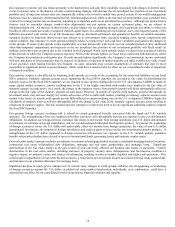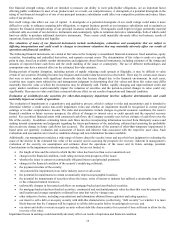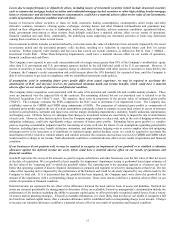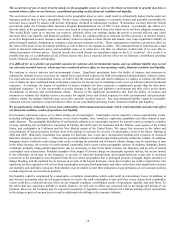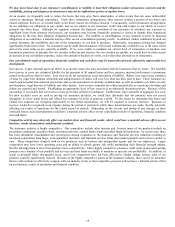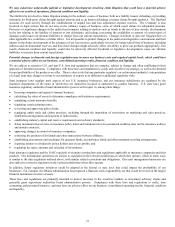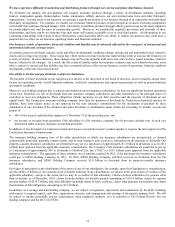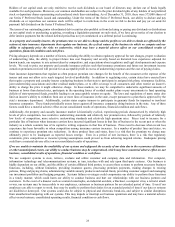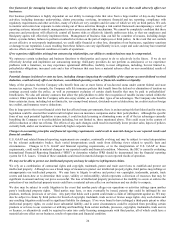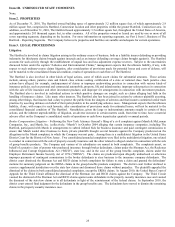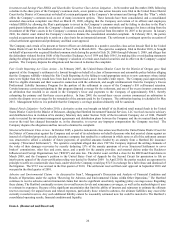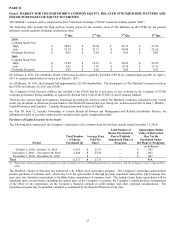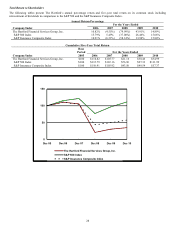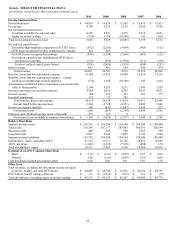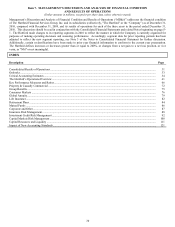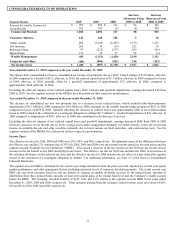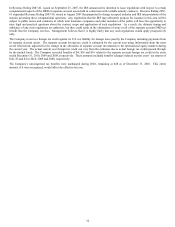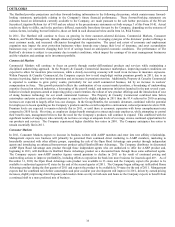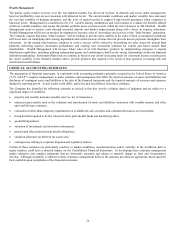The Hartford 2010 Annual Report Download - page 24
Download and view the complete annual report
Please find page 24 of the 2010 The Hartford annual report below. You can navigate through the pages in the report by either clicking on the pages listed below, or by using the keyword search tool below to find specific information within the annual report. 24
Our framework for managing business risks may not be effective in mitigating risk and loss to us that could adversely affect our
businesses.
Our business performance is highly dependent on our ability to manage risks that arise from a large number of day-to-day business
activities, including insurance underwriting, claims processing, servicing, investment, financial and tax reporting, compliance with
regulatory requirements and other activities, many of which are very complex and for some of which we rely on third parties. We seek
to monitor and control our exposure to risks arising out of these activities through a risk control framework encompassing a variety of
reporting systems, internal controls, management review processes and other mechanisms. We cannot be completely confident that these
processes and procedures will effectively control all known risks or effectively identify unforeseen risks, or that our employees and
third-party agents will effectively implement them. Management of business risks can fail for a number of reasons, including design
failure, systems failure, failures to perform or unlawful activities on the part of employees or third parties. In the event that our controls
are not effective or not properly implemented, we could suffer financial or other loss, disruption of our businesses, regulatory sanctions
or damage to our reputation. Losses resulting from these failures can vary significantly in size, scope and scale and may have material
adverse effects on our financial condition or results of operations.
If we experience difficulties arising from outsourcing relationships, our ability to conduct business may be compromised.
We outsource certain technology and business functions to third parties and expect to do so selectively in the future. If we do not
effectively develop and implement our outsourcing strategy, third-party providers do not perform as anticipated, or we experience
problems with a transition, we may experience operational difficulties, inability to meet obligations, including, but not limited to,
policyholder obligations, increased costs and a loss of business that may have a material adverse effect on our consolidated results of
operations.
Potential changes in federal or state tax laws, including changes impacting the availability of the separate account dividend received
deduction, could adversely affect our business, consolidated operating results or financial condition or liquidity.
Many of the products that the Company sells benefit from one or more forms of tax-favored status under current federal and state
income tax regimes. For example, the Company sells life insurance policies that benefit from the deferral or elimination of taxation on
earnings accrued under the policy, as well as permanent exclusion of certain death benefits that may be paid to policyholders’
beneficiaries. We also sell annuity contracts that allow the policyholders to defer the recognition of taxable income earned within the
contract. Other products that the Company sells also enjoy similar, as well as other, types of tax advantages. The Company also benefits
from certain tax items, including but not limited to, tax-exempt bond interest, dividends-received deductions, tax credits (such as foreign
tax credits), and insurance reserve deductions.
Due in large part to the recent financial crisis that has affected many governments, there is an increasing risk that federal and/or state tax
legislation could be enacted that would result in higher taxes on insurance companies and/or their policyholders. Although the specific
form of any such potential legislation is uncertain, it could include lessening or eliminating some or all of the tax advantages currently
benefiting the Company or its policyholders including, but not limited to, those mentioned above. This could occur in the context of
deficit reduction or other tax reforms. The effects of any such changes could result in materially lower product sales, lapses of policies
currently held, and/or our incurrence of materially higher corporate taxes.
Changes in accounting principles and financial reporting requirements could result in material changes to our reported results and
financial condition.
U.S. GAAP and related financial reporting requirements are complex, continually evolving and may be subject to varied interpretation
by the relevant authoritative bodies. Such varied interpretations could result from differing views related to specific facts and
circumstances. Changes in U.S. GAAP and financial reporting requirements, or in the interpretation of U.S. GAAP or those
requirements, could result in material changes to our reported results and financial condition. Moreover, the SEC is currently evaluating
International Financial Reporting Standards (“IFRS”) to determine whether IFRS should be incorporated into the financial reporting
system for U.S. issuers. Certain of these standards could result in material changes to our reported results of operation.
We may not be able to protect our intellectual property and may be subject to infringement claims.
We rely on a combination of contractual rights and copyright, trademark, patent and trade secret laws to establish and protect our
intellectual property. Although we use a broad range of measures to protect our intellectual property rights, third parties may infringe or
misappropriate our intellectual property. We may have to litigate to enforce and protect our copyrights, trademarks, patents, trade
secrets and know-how or to determine their scope, validity or enforceability, which represents a diversion of resources that may be
significant in amount and may not prove successful. The loss of intellectual property protection or the inability to secure or enforce the
protection of our intellectual property assets could have a material adverse effect on our business and our ability to compete.
We also may be subject to costly litigation in the event that another party alleges our operations or activities infringe upon another
party’ s intellectual property rights. Third parties may have, or may eventually be issued, patents that could be infringed by our
products, methods, processes or services. Any party that holds such a patent could make a claim of infringement against us. We may
also be subject to claims by third parties for breach of copyright, trademark, trade secret or license usage rights. Any such claims and
any resulting litigation could result in significant liability for damages. If we were found to have infringed a third-party patent or other
intellectual property rights, we could incur substantial liability, and in some circumstances could be enjoined from providing certain
products or services to our customers or utilizing and benefiting from certain methods, processes, copyrights, trademarks, trade secrets
or licenses, or alternatively could be required to enter into costly licensing arrangements with third parties, all of which could have a
material adverse effect on our business, results of operations and financial condition.


